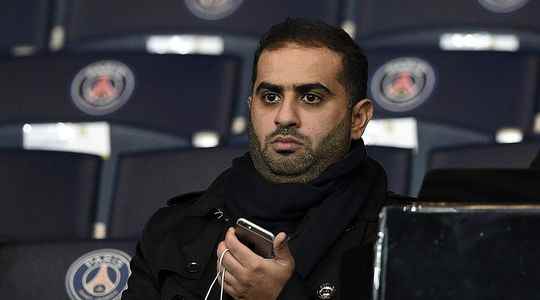Mandarine Cafe is tucked away in a corner of Doha. Far from the luxury hotels, this small Lebanese ice cream parlor attracts insiders from the Qatari capital like Yousef Al-Oblaidly, where it has long had its habits. Thierry Foures-Morano, who worked in the early 2000s on the acquisition of sports rights for the Al-Jazeera channel in the peninsula, often accompanied the man who would become the big boss of the beIN Sports group in this unpretentious diner.
As soon as he moved to Doha, the Frenchman surrounded himself with a small band: Nasser Al-Khelaïfi, president of Paris Saint-Germain and former general manager of beIN Sports, and the channel’s current boss, Yousef Al – Obaidly. The three men love the cars, the food and the glitz of the emirate. After work, they have a ritual: drink a glass of milkshakes while talking football. In October 2003, the meeting between the three friends took a decisive turn for Al-Obaidly’s career. “With Nasser, we wanted to bring him with us to Al-Jazeera. Yousef refused. By dint of unfolding the arguments, we ended up snatching a yes from him just before he got out of the car”, narrates his former friend.
Yousef Al-Obaildy did well to let himself be convinced. Since then, it has become one of the most essential links in the sports diplomacy system practiced by the emirate. For a decade, first in France, then in the rest of the world, he scrapped to make Qatar a stronghold of sport in the media. By imposing live sports coverage, he succeeded in giving credibility to Qatar with spectators and authorities. BeIn Sports broadcasts almost all professional sports around the world and is now present in 43 countries. A phenomenal striking power to ripolinate the country’s image, culminating in the organization of the Football World Cup.
Pure product of the Qatari elite
The choice in the fall of 2003 of Yousef Al-Obaildly did not, however, flow naturally. He knew almost nothing about television when he was poached by Al-Jazeera. An executive at Kamari, the local EDF, the man is a pure product of the Qatari elite: he studied in the United States, and dreams of a career in the country’s administration. The news channel is proving to be an incredible springboard as it is at the center of the executive’s attention. Launched in 1996, the one which aims to become the BBC of the Arab world is a powerful communication tool in favor of the Qatari ambition to exist on the international scene.
As the years go by, the channel grows and its assiduous coverage of the Arab Spring exposes it to criticism from neighboring countries. “They needed another product, quieter, politically calm, which does not open up to conflicts. A sports channel is ideal, it’s a nice product”, confides a former executive of the management of beIN Sports France. It is with this idea in mind that the tandem of the two friends Al-Khelaïfi and Al-Obaidly was chosen to build the French editorial staff of beIN Sports, the group’s first branch. The launch is a crash test.
positive message
The specifications are simple: avoid any controversy. The recruitment of young dynamic journalists goes in this direction. From the first live broadcasts during Euro 2012 and the Olympic Games in London, beIN Sports carried a positive message. “We have often been criticized for it, it’s very naive, but I like it when things are going well!” Laughs Smaïl Bouabdellah, a former animator at the house.
In the premises of the Factory in Boulogne-Billancourt, there is no question of pointing out the wanderings of the French team as does its competitor Canal +. There is also no question of scratching Vincent Labrune, yet president of the Marseille rival when he is received on the set in the midst of a sporting storm in the Marseille city. This smooth line has a second advantage: management does not have to meddle in editorial matters as was the case at Al-Jazeera. “I never had an appointment with Yousef for him to tell me, that yes, that no, that yes … never”, assures Alexandre Ruiz, former star journalist of the channel. The boss is not often elsewhere in Paris. His collaborators rub shoulders with him behind a computer screen rather than during weekly meetings.
The eye of Doha
The successful launch of beIN Sports France installs this former tennis player of good level as the conductor of the multiplication of channels around the world. The development model is simple: use the same recipe as in France. Entertainment, expertise and technical means… All while having a keen eye on finances. The baby-faced chain director holds the purse strings of his shareholder with a rigor that sometimes turns into an obsession according to some members of the Parisian editorial staff. “The slightest expense went through Yousef. All the financing of the shows, the reports … He also imposed himself in this way”, blows a reporter who left for the competition.
Loyal and devoted, Al-Obaidly has acquired a nickname over time in the corridors of competing chains: “the eye of Doha”. In the city that saw him grow up, the entire World Cup will be accessible on national antennas, the cafes retransmitting programs around the competition on a loop. Billboards touting beIN’s coverage are legion. In refrigerated shopping centers, hostesses distribute leaflets to encourage subscriptions as one of the biggest events in the country’s history approaches. It does not include the face of Yousef Al-Obaidly, still in the shadows, but all eyes are now on the channel he directs.
